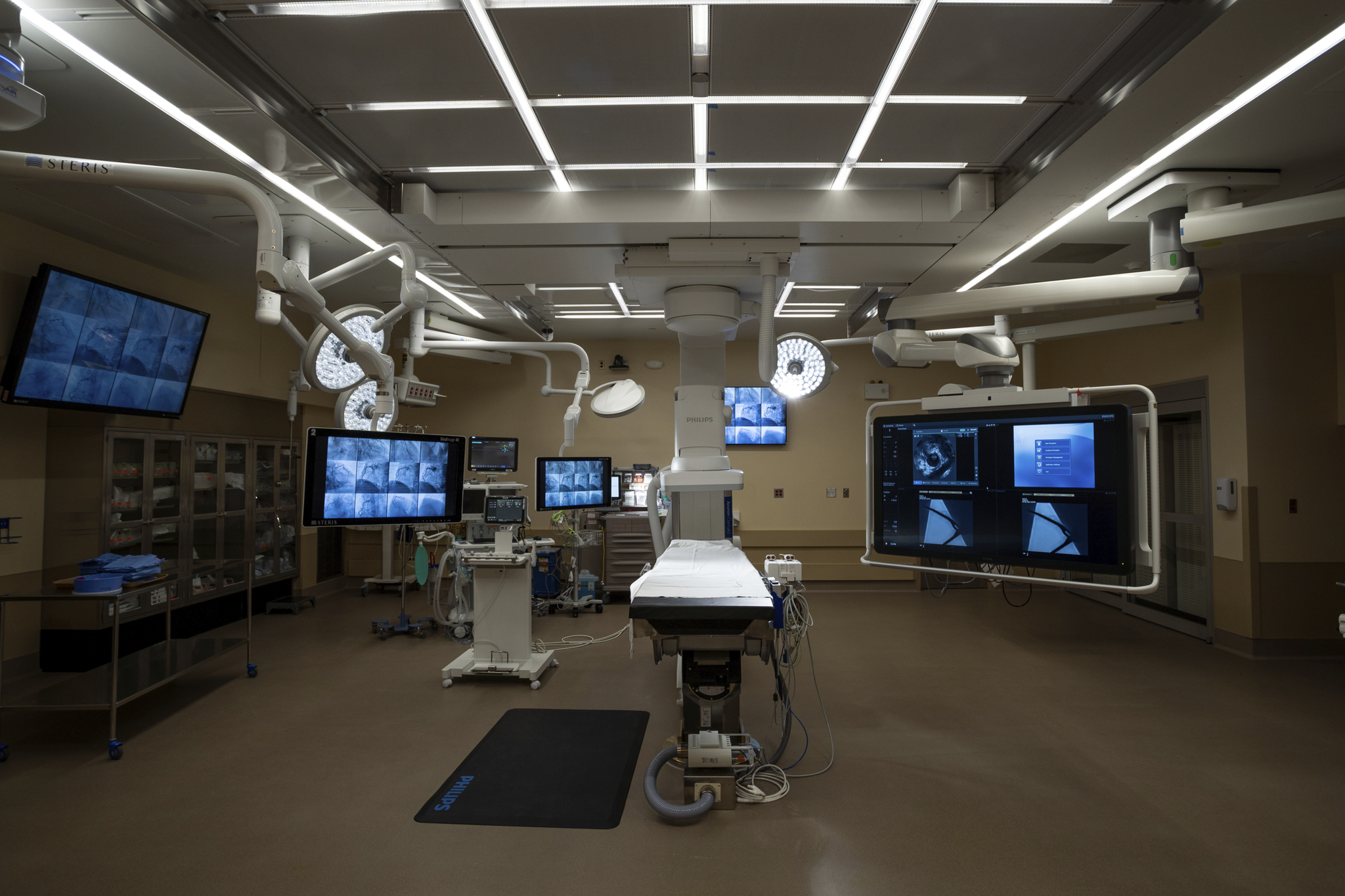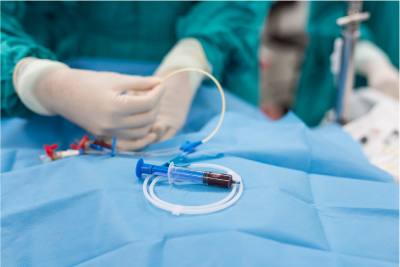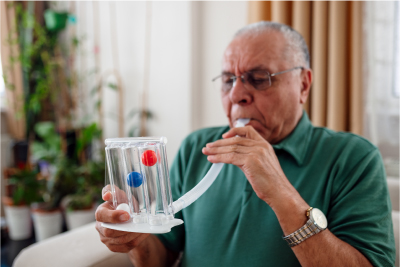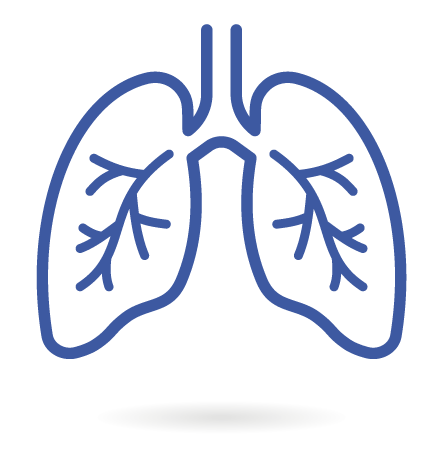
Your Lung Care Journey Starts Here
When it comes to lung care, the Heart & Lung Institute leads the way in advanced diagnostic testing and cutting-edge treatments. Our expert pulmonologists, thoracic surgeons, and respiratory therapists work together to deliver personalized care tailored to your needs. We are committed to keeping you informed and engaged in your treatment plan, so you always have direct access to your care team and feel supported throughout your path to better lung health.
Our Areas of Expertise
Interventional Pulmonary and Thoracic Endoscopy Services
At Community, we provide advanced, minimally invasive procedures to help diagnose, stage and treat conditions affecting the airways, lungs, esophagus and the area between the lungs (mediastinum). Our approach uses specialized tools through the airways or esophagus, meaning no surgery or incisions are needed.
Our highly trained interventional pulmonologists and thoracic endoscopists offer a range of minimally invasive procedures to address various lung and thoracic conditions. These include:

- Airway Stenting
- Airway Tumor Removal
- Airway/Esophageal Dilation
- Bronchoscopic Lung Volume Reduction for Emphysema
- Chest Ultrasound
- Cryobiopsy
- Cyberknife Fiducial Placement
- EBUS (Endobronchial Ultrasound)
- EUS (Endoscopic Ultrasound)
- Esophageal Stenting
- Esophagoscopy
- Fistula Treatment
- Feeding Tube Placement (PEG)
- Lung Cancer Detection
- Pleural Catheter Insertion
- Pleuroscopy
- Robotic Bronchoscopy
- Therapeutic Bronchoscopy
- Tracheostomy Placement
- Tumor Ablation (Laser/Cryotherapy)

Common Conditions Needing Advanced Interventional
Bronchoscopy/Thoracic Endoscopy Procedures:
- Airway and Esophageal fistulas, strictures
- Airway Tumors
- Lung Cancer
- Lung Nodules
- Lung Mass
- Malignant Pleural effusions
- Mediastinal Adenopathy
- Severe Emphysema
- Thoracic Malignancies
- Tracheal Stenosis
General Pulmonary Services
Our general pulmonologists are experts in diagnosing, treating and managing a wide range of lung conditions. We offer comprehensive care tailored to your needs, including:
- Bronchiectasis
- Cardio-Pulmonary Exercise Testing
- Chronic Cough
- Diagnostic Flexible Bronchoscopy and Laryngoscopy
- Dyspnea (Shortness of Breath)
- Interstitial Lung Diseases
- Lung Infections
- Obstructive Lung Diseases (Asthma, COPD, Emphysema)
- Pleural Effusions/Obstructive Lung Diseases (Asthma, COPD, Emphysema)
- Pulmonary Fibrosis
- Pulmonary Function Testing
- Pulmonary Vascular Diseases (Pulmonary Hypertension)
- Sarcoidosis
- Tracheostomy Care

Awards & Accreditations
Healthgrades® Five-Star Recipient for Treatment of Pneumonia in 2022 & 2024
Clovis Community Medical Center received this award for excellence in pneumonia care, helping patients recover faster and with fewer complications. Our team is dedicated to providing the best possible treatment to support your lung health.
Consumers can visit Healthgrades.com to learn more about how Healthgrades measures hospital quality.
Healthgrades® Five-Star Recipient for Treatment of Respiratory Failure in 2022-2024
Community Regional Medical Center and Fresno Heart & Surgical Hospital, received this award that highlights our success in treating respiratory failure, ensuring patients receive critical care with the best possible outcomes. We work tirelessly to help you breathe and heal.
Consumers can visit Healthgrades.com to learn more about how Healthgrades measures hospital quality.
Healthgrades® Pulmonary Care Excellence Award™ 2022-2024
Community Regional Medical Center and Fresno Heart & Surgical Hospital, received this award that acknowledges our hospital’s excellence in treating lung diseases, offering top-tier care for conditions like asthma, COPD, and pneumonia. We are dedicated to helping you breathe easier and live well.
Consumers can visit Healthgrades.com to learn more about how Healthgrades measures hospital quality.
Healthgrades® Five-Star Recipient for Treatment of Chronic Obstructive Pulmonary Disease in 2022-2024
Community Regional Medical Center and Fresno Heart & Surgical Hospital received this award that signifies excellence in the treatment of COPD, ensuring patients receive advanced care to manage symptoms and improve quality of life. We are dedicated to helping you breathe easier and live better.
Consumers can visit Healthgrades.com to learn more about how Healthgrades measures hospital quality.
Patient Resources
Lung Nodule Program
The Lung Nodule Program is one of the largest programs in the nation focused on the early detection and speedy treatment of lung cancer.
This program is the first of its kind in the Central Valley and one of only a handful like it in the country.
Our program is focused on:
- Enhanced early diagnosis of cancer by using ultra low-dose CT screening in high-risk smokers
- Expedited lung cancer diagnosis and cancer staging using advanced technology and gene mutation studies
- Improved survival by rapid treatment access and meticulous patient follow-up for five years
The lung nodule program brings together a multidisciplinary team of specialists that includes:
- Pulmonologists
- Interventional pulmonologists
- Thoracic surgeons
- Radiologists
- Radiation oncologists
- Medical oncologists
Our interventional pulmonologists are highly trained in advanced procedures and perform electromagnetic navigation, endobronchial ultrasounds, endoscopic ultrasounds and biopsies, as well as endoscopic ultrasound-guided left adrenal gland biopsies. These advanced procedures provide patients with a one-step diagnostic biopsy and staging in lung cancer. In addition, cancer compilations are managed by tumor coring, airway stenting, airway dilatation and pleural procedures.
The multidisciplinary approach provides patients with optimal diagnosis and management of lung cancer at all stages. The multidisciplinary team meets often to diagnose, assess and design targeted customized treatment plans based on the specific characteristics of each patient’s cancer type. Treatment plans may include surgery, CyberKnife, radiation and/or chemotherapy and targeted immunotherapy.

Patient Stories
Lung Nodule Program
When it comes to treating lung cancer, early detection is key. Community Medical Centers' Lung Nodule Program brings multiple specialists together to collaborate on best approach for the treatment of lung cancer for patients in the Valley.
Local Man has LVAD Device Removed from his Heart
Local resident Gary Hill receives a very special honor after Community surgeons perform a modern day miracle by removing the heart pump that saved his life.
Treating aortic stenosis with TAVR
After Dr. Kumar Sanam diagnosed his patient, Roger Anthony, with aortic stenosis, he proceeded to perform a transcatheter aortic valve replacement procedure (or TAVR) to get Roger back to living his life.
Advanced cardiac care saves local restaurateur experiencing ‘widowmaker’ heart attack
If it wasn’t for the advanced cardiac care available at Clovis Community, Aaron Vasquez likely wouldn’t have survived one of the deadliest heart attacks.
Detecting & diagnosing lung cancer sooner
The first to offer it on the west coast, Community Regional’s Dr. Pravachan Hegde shows how the new Galaxy System helps with early diagnosis and treatment of lung cancer, and what it means for Valley patients.
Robot Surgery for Lung Cancer
After getting routine blood work done, Debbie Wray just thought she had abnormal cholesterol levels. But after a CT scan, doctors at Community determined it was lung cancer — that's when she was referred to Community's Lung Nodule Program where she met Dr. John Lin. Dr. Lin performed surgery, and Debbie is now back to living a full life.
We use cookies and other tools to optimize and enhance your experience on our website. View our Privacy Policy.

